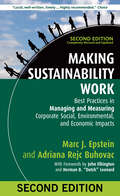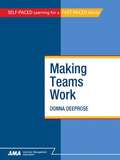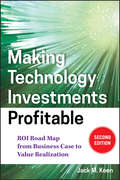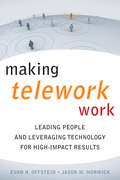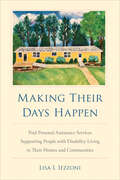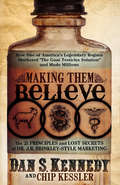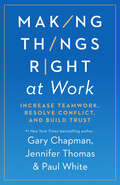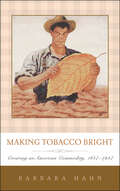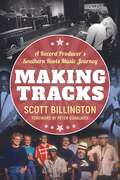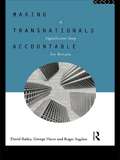- Table View
- List View
Making Sustainability Work: Best Practices in Managing and Measuring Corporate Social, Environmental, and Economic Impacts
by Marc J. Epstein Adriana Rejc BuhovacMost companies today have some commitment to corporate social responsibility, but implementing these initiatives can be particularly challenging. While a lot has been written on ethical and strategic factors, there is still a dearth of information on the practical nuts and bolts. And whereas with most other organizational initiatives the sole objective is improved financial performance, sustainability broadens the focus to include social and environmental performance, which is much more difficult to measure.Now updated throughout with new examples and new research, this is a complete guide to implementing and measuring the effectiveness of sustainability initiatives. It draws on Marc Epstein's and new coauthor Adriana Rejc Buhovac's solid academic foundation and extensive consulting work and includes best practices from dozens of companies in Europe, Asia, North America, South America, Australia, and Africa. This is the ultimate how-to guide for corporate leaders, strategists, academics, sustainability consultants, and anyone else with an interest in actually putting sustainability ideas into practice and making sure they accomplish their goals.
Making Sweatshops: The Globalization of the U. S. Apparel Industry
by Ellen Israel RosenA comprehensive historical analysis of the globalization of the U.S. apparel industry, this book focuses on the re-emergence of sweatshops in the United States and the growth of new ones abroad.
Making Target the Target: Boycotts and Corporate Political Activity
by Victor Wu Nien-He HsiehThrough the challenges facing Target, the case examines the ways in which corporations can become involved in political and legistlaive debates and processes, ranging from campaign conrbitutions to lobbying. In 2016, Target CEO Brian Cornell must determine how to respond to the debate over North Carolina's recently signed law, commonly known as "HB2," that invalidated LGBT non-discrimination ordinances at the local level. In contrast to other organizations, Target did not threaten to leave the state. However, its public statement in support of LGBT rights prompted a boycott against its stores. Adding to the difficulty was the fact that Target was caught on the other side of the debate in 2010 in one of the earliest high-profile controversies resulting from the Citizens United ruling. Target had contributed to a SuperPAC supporting business-friendly candidates. As one of the candidate's opposition to same-sex marriage became well publicized, Target faced a consumer boycott as well as a shareholder proposal to change its policies on political contributions. The case covers current campaign finance regulations as they relate to business as well as Target's lobbying activities regarding online sales tax legislation.
Making Target the Target: Boycotts and Corporate Political Activity
by Victor Wu Nien-He HsiehThrough the challenges facing Target, the case examines the ways in which corporations can become involved in political and legistlaive debates and processes, ranging from campaign conrbitutions to lobbying. In 2016, Target CEO Brian Cornell must determine how to respond to the debate over North Carolina's recently signed law, commonly known as "HB2," that invalidated LGBT non-discrimination ordinances at the local level. In contrast to other organizations, Target did not threaten to leave the state. However, its public statement in support of LGBT rights prompted a boycott against its stores. Adding to the difficulty was the fact that Target was caught on the other side of the debate in 2010 in one of the earliest high-profile controversies resulting from the Citizens United ruling. Target had contributed to a SuperPAC supporting business-friendly candidates. As one of the candidate's opposition to same-sex marriage became well publicized, Target faced a consumer boycott as well as a shareholder proposal to change its policies on political contributions. The case covers current campaign finance regulations as they relate to business as well as Target's lobbying activities regarding online sales tax legislation.
Making Target the Target: Boycotts and Corporate Political Activity
by Victor Wu Nien-He HsiehThrough the challenges facing Target, the case examines ways in which corporations can become involved in political and legislative debates and processes, ranging from campaign contributions to lobbying to political activism. In 2016, Target CEO Brian Cornell must determine how to respond to the debate over North Carolina's recently signed law, commonly known as "HB2," that invalidated LGBT non-discrimination ordinances at the local level. In contrast to other organizations, Target did not threaten to leave the state. However, its public statement in support of LGBT rights prompted a boycott against its stores. Adding to the difficulty was the fact that Target was caught on the other side of the debate in 2010 in one of the earliest high-profile controversies resulting from the Supreme Court Citizens United ruling. Target had contributed to a super PAC supporting business friendly candidates. As one of the candidate's opposition to same-sex marriage became well publicized, Target faced a consumer boycott as well as a shareholder proposal to change its policies on political contributions. The case covers current campaign finance regulations as they relate to business as well as Target's lobbying activities regarding online sales tax legislation.
Making Target the Target: Boycotts and Corporate Political Activity (B)
by Victor Wu Nien-He HsiehSupplement to case 317113.
Making Target the Target: Boycotts and Corporate Political Activity (B)
by Victor Wu Nien-He HsiehSupplement to case 317113.
Making Teams Work
by Donna DeeproseSuccessfully achieve business objectives through the use of teams. Why work in teams? Simply put, PERFORMANCE! Teams vastly outperform the combined output of individuals in traditional work settings. But high performance teams require planning, accountability, and commitment. This book gives you the tools you need to build a case for teaming in your organization, set performance goals, and continually measure team effectiveness. You’ll learn how to identify and foster the characteristics of successful teams, define responsibilities for team members, and overcome common obstacles to high performance. What’s more, you will put your newfound skills to the test using real-world business case scenarios provided throughout the book. And you’ll gauge the effectiveness of your own team with in-depth self-assessment exercises. The skills you will master here can be applied to any team situation—from a single work unit team to wider multi-unit teams spanning the organization. Readers will learn how to: • Identify the best type of team for your organization • Perform the essential “getting off to a good start” steps • Define key responsibilities for team members and team leader • Set the best goals against which to measure performance • Anticipate and address team transitions
Making Technology Investments Profitable
by Jack M. KeenA guide to getting the crucial business case right?every time Showing professionals how to calculate the value of typical budgeting and funding requests quickly and easily, Making Technology Investments Profitable, Second Edition applies the "Value Realization" process, using proven strategies that maximize the business payoff from IT projects. Filled with case studies, this innovative book enables managers to confidently quantify, in a matter of minutes, the true business value of funding a desired project. New edition explains how to proactively manage the conversion of a business case's value promise to its value realization Includes dozens of new case studies on realizing maximum value from IT enabled investments from various industries and around the world New checklists and tables A dedicated Web site containing additional material, case studies, chat rooms, and blogs on the value-realization process The Second Edition provides senior executives, project managers, and technical staff with new insights on how to get the crucial business case right, while also explaining how to proactively manage the conversion of the business case's value promise into the value reality of a completed project.
Making Telework Work: Leading People and Leveraging Technology for High-Impact Results
by Evan H. Offstein Jason M. MorwickLeaders learn from dozens of examples how to increase overall productivity, achieve organizational goals at a faster pace, and harness talent more effectively with Making Telework Work. Integrating technology into the workplace becomes simple and straightforward with the advice of Jason Morwick and Evan Offstein.
Making Telework Work: Leading People and Leveraging Technology for High-Impact Results
by Evan H. OffsteinThe traditional workforce—using the model of the 9-to-5 employee—is a thing of the past. Companies, and their employees, are utilizing flex-time and work-from-home arrangements. Modern telework solutions counter problems of escalating real estate costs, traffic and commuting and employee turnover, and promote carbon footprint reduction and higher employee productivity and satisfaction. Telework has taken center stage as a means to generating productive business. Making Telework Work is a call to action, helping organizations gain competitive advantage in a technology-rich world. Leaders of teleworkers must grasp the big picture while still accounting for the details. To do so means developing capabilities that mark extraordinary leadership, not just run of the mill management.
Making The Team: A Guide for Managers
by Leigh L. ThompsonThis text provides a good balance of theory and practice. It combines cutting-edge research on groups with practical management principles. The text is organized into 3 primary tasks for the leader/manager: 1) Accurately assessing and improving team performance; 2) Managing the internal dynamics of teams (diversity, conflict, and creativity); and 3) Optimally leveraging the team within the larger organization. It is written for both team leaders and team members.
Making Their Days Happen: Paid Personal Assistance Services Supporting People with Disability Living in Their Homes and Communities
by Lisa I. IezzoniMost Americans—even those with significant disability—want to live in their homes and communities. Unpaid family members or friends often work as “informal” caregivers, helping those who need assistance— and many feel they have no option but to serve. In contrast, paid personal assistance services workers (PAS) provide a lifeline to those consumers with complex needs and limited social networks. However, there is a crisis looming in the increasing needs for paid PAS and the limited available PAS workforce. Making Their Days Happen explores disability, health, and civil rights, along with relevant federal and state labor policies related to personal assistance services. Lisa Iezzoni addresses the legal context of paid PAS as well as financing mechanisms for obtaining home-based personal assistance. She also draws upon interviews she conducted with paid PAS consumers and PAS workers to explore PAS experiences and their perspectives about their work. Offering recommendations for improving future experiences of PAS consumers and providers, Iezzoni emphasizes that people with disabilities want to be a part of society, and PAS workers who do this low-wage work find satisfaction in helping them achieve their goals.
Making Them Believe: The 21 Principles and Lost Secrets of Dr. J. R. Brinnkley-Style Marketing
by Dan S. Kennedy Chip KesslerDR. JOHN BRINKLEY was, at one time, the wealthiest doctor of his time, undeniably the most Barnum-esque promoter in medicine in his time, vilified and prosecuted as a quack, praised as saint by the amazing number of men who flocked to him for his 'fountain of youth'---and by their wives. This book delves deeply into his TWENTY-ONE MARKETING PRINCIPLES, to provide a blueprint for adventurous advertising, marketing, promotion and personal promotion that can install a 'fountain of profits' in just about any business! IF YOU&’D LIKE TO---AND WOULD PROFIT FROM---making yourself or your business famous and magnetically attractive, locally or globally, this in-depth analysis of The Lost Secrets behind this amazing success story are for you! IN THIS BOOK---DISCOVER…Dynamic pathways to Maximum AUTHORITY---so that you are sought out and your 'prescriptions' accepted without question; two kinds of CLARITY essential for marketing success---missing from most businesses; THE question to ask yourself, that, when answered, dramatically multiplies the power of advertising and elevates you above all competition; the 3-Step Brinkley Blueprint for savvy use of media---the trap most businesspeople fall victim to; a most radical, revolutionary change to your entire approach to selling---why the sale delayed can be the sale more easily made; the Brinkley Prescription for virtually unlimited PRICE ELASTICITY & the all-time, best-ever answer to any and every price objection; and the Brinkley Secret to BEING ADMIRED---as means of attracting customers especially eager to do business with you. INCLUDED: TRANSCRIPT of a Brinkley Radio Broadcast ...ARCHIVE EXAMPLES of actual Dr. Brinkley sales literature and sales copy from his advertising. PLUS, MONEYMAKING SECRETS & LESSONS FROM Napoleon Hill (author, Think and Grow Rich), Donald Trump, Martha Stewart, Dr. Atkins, Zig Ziglar, Dave Thomas (Wendy&’s), and Avatar.
Making Them Pay: How to Get the Most from Health Insurance and Managed Care
by Rhonda D. OrinMost people don't understand health insurance, and insurance companies know it. Unfair denials, late payments, and hopeless confusion are the norm. At last there is a solution. In eight easy steps, Making Them Pay gives practical advice about the things that drive people crazy. Like:-Figuring out what health plans really say-Understanding what benefits they provide-Finding, and understanding, the exclusions-Determining what health plans really cost-How to talk to customer service, and other painful details-Easy ways to keep good records-Laws that can change your life-like the mandatory benefits laws in all fifty states-How to prepare successful appealsAlong with this useful advice, Making Them Pay offers a much-needed sense of humor. It's filled with cartoons, sidebars, and vignettes that will make you laugh as you learn. Based on Rhonda D. Orin's extensive experience as a litigator, a journalist, and a mother fighting her own family's insurance battles, Making Them Pay is the book your health insurer doesn't want you to read."A compact reference [that] simplifies a convoluted subject. -
Making Things Right at Work: Increase Teamwork, Resolve Conflict, and Build Trust
by Gary Chapman Paul White Jennifer M ThomasWorkplace conflict is inevitable. When it happens, how can you get back on track?Like all relationships, the ones we have at work are subject to stresses—maybe even fractures that can really take a toll on the workplace. Productivity is lost. Time is wasted. Tension mounts. Cooperation is reduced. And the workplace becomes toxic. What&’s the solution?In Making Things Right at Work, Dr. Gary Chapman, #1 New York Times bestselling author of The 5 Love Languages®, is joined by business consultants Dr. Jennifer Thomas and Dr. Paul White to offer the strategies you need to restore harmony at work. You&’ll learn:How to discern the causes of workplace conflictHow to avoid unnecessary disputesHow to repair relationships when you&’ve messed upHow to let go of past hurts and rebuild trustDon&’t let broken relationships taint your work environment. Take the needed steps to make things right . . . not tomorrow, but today. The success of your career depends on it!
Making Things Right at Work: Increase Teamwork, Resolve Conflict, and Build Trust
by Gary Chapman Paul White Jennifer M ThomasWorkplace conflict is inevitable. When it happens, how can you get back on track?Like all relationships, the ones we have at work are subject to stresses—maybe even fractures that can really take a toll on the workplace. Productivity is lost. Time is wasted. Tension mounts. Cooperation is reduced. And the workplace becomes toxic. What&’s the solution?In Making Things Right at Work, Dr. Gary Chapman, #1 New York Times bestselling author of The 5 Love Languages®, is joined by business consultants Dr. Jennifer Thomas and Dr. Paul White to offer the strategies you need to restore harmony at work. You&’ll learn:How to discern the causes of workplace conflictHow to avoid unnecessary disputesHow to repair relationships when you&’ve messed upHow to let go of past hurts and rebuild trustDon&’t let broken relationships taint your work environment. Take the needed steps to make things right . . . not tomorrow, but today. The success of your career depends on it!
Making Tobacco Bright: Creating an American Commodity, 1617–1937 (Johns Hopkins Studies in the History of Technology)
by Barbara M. HahnHow did Bright Flue-Cured Tobacco come to dominate the industry?In her sweeping history of the American tobacco industry, Barbara Hahn traces the emergence of the tobacco plant’s many varietal types, arguing that they are products not of nature but of economic relations and continued and intense market regulation. Hahn focuses her study on the most popular of these varieties, Bright Flue-Cured Tobacco. First grown in the inland Piedmont along the Virginia–North Carolina border, Bright Tobacco now grows all over the world, primarily because of its unique—and easily replicated—cultivation and curing methods. Hahn traces the evolution of technologies in a variety of regulatory and cultural environments to reconstruct how Bright Tobacco became, and remains to this day, a leading commodity in the global tobacco industry. This study asks not what effect tobacco had on the world market, but how that market shaped tobacco into types that served specific purposes and became distinguishable from one another more by technologies of production than genetics. In so doing, it explores the intersection of crossbreeding, tobacco-raising technology, changing popular demand, attempts at regulation, and sheer marketing ingenuity during the heyday of the American tobacco industry. Combining economic theory with the history of technology, Making Tobacco Bright revises several narratives in American history, from colonial staple-crop agriculture to the origins of the tobacco industry to the rise of identity politics in the twentieth century.
Making Tracks: A Record Producer’s Southern Roots Music Journey (American Made Music Series)
by Scott BillingtonFrom the 1980s through the early 2000s, a golden era for southern roots music, producer and three-time Grammy winner Scott Billington recorded many of the period’s most iconic artists. Working primarily in Louisiana for Boston-based Rounder Records, Billington produced such giants as Irma Thomas, Charlie Rich, Buckwheat Zydeco, Johnny Adams, Bobby Rush, Ruth Brown, Beau Jocque, and Solomon Burke. The loving and sometimes irreverent profiles in Making Tracks reveal the triumphs and frustrations of the recording process, and that obsessive quest to capture a transcendent performance. Billington's long working relationships with the artists give him perspective to present them in their complexity—foibles, failures, and fabled feats—while providing a vivid look at the environs in which their music thrived. He tells about Boozoo Chavis’s early days as a musician, jockey, and bartender at his mother’s quarter horse track, and Ruth Brown’s reign as the most popular star in rhythm and blues, when the challenge of traveling on the “chitlin’ circuit” proved the antithesis of the glamour she exuded on stage. In addition, Making Tracks provides a widely accessible study in the craft of recording. Details about the technology and psychology behind the sessions abound. Billington demonstrates varying ways of achieving the mutual goal of a great record. He also introduces the supporting cast of songwriters, musicians, and engineers crucial to the magic in each recording session. Making Tracks sings unforgettably like a "from the vault" discovery.
Making Transnationals Accountable: A Significant Step for Britain
by David Bailey Roger Sugden George HarteFirst published in 1994. Routledge is an imprint of Taylor & Francis, an informa company.
Making UK Energy Smarter
by John R. Wells Benjamin WeinstockThis case describes the history of the United Kingdom's domestic energy industry and the country's efforts to create a more competitive, greener, and distributed power sector. On July 24, 2017, the United Kingdom government and the industry regulator, the Office of Gas and Electricity Markets (Ofgem), published a report listing 29 actions to be taken to "remove barriers to smart technologies," "enable smart homes and businesses," and "improve access to energy markets for new technologies and business models." The report promised yet more disruption for the 60 suppliers who provided energy for the UK's 27.1 million households. How welcome the proposals would be to the players in the industry was not clear. The "Big Six" vertically-integrated generators and retailers, which accounted for more than 80% of the market, were facing declining sales and market share in the face of a huge number of new entrants: 30 in the last three years alone. The recent threat of a price cap on bills - or even a government take-over - did little to encourage further investment. Meanwhile, a group of six mid-tier challengers, accounting for 12% of the market, had grown big enough to be burdened with the many social and environmental charges faced by the Big Six and their growth had slowed. Several of them were now diversifying into other service offerings such as broadband or homeowner's insurance, or were looking for opportunities overseas. Then there were more than 50 small players, mostly recent entrants. While many were growing fast, often using their customers' deposits to fund growth, they were not profitable and had limited capacity for investment in "smarter energy." Meanwhile, the UK government was keen to encourage players such as Google and Amazon into the market to drive disruption. Just how quickly the UK energy market would get smarter remained to be seen.
Making Universities Matter: Collaboration, Engagement, Impact (Innovation, Technology, and Knowledge Management)
by Linus Salö Pauline Mattsson Eugenia Perez VicoIn an era of rapid change and increasing societal demands, the role of universities as knowledge producers and catalysts for change has come under scrutiny. This open access book offers a fresh perspective on the significance of universities in society, shedding light on how their knowledge can truly matter beyond academia. Drawing upon insightful inquiries from both the Swedish and international contexts, this volume delves into the multifaceted interactions between universities and various knowledge users, emphasizing the need for scholars to reflect on how their knowledge can become useful and applicable to wider society. Organized into three compelling themes, collaboration, engagement, and impact, this book explores the concept of "mattering". Together and jointly, they point at the fluid movement of scholars and scholarly knowledge across academic, political, and public spaces, and the intentional actions of scientists to leverage their expertise for real-world impact. Essential reading for social science and humanities scholars, university management professionals, and individuals keen on a critical understanding of the evolving role of universities, this volume offers a comprehensive examination of how universities have mattered, continue to matter, and can shape the future.
Making Up Accountants: The Organizational and Professional Socialization of Trainee Chartered Accountants (Routledge Revivals)
by Fiona Anderson-GoughFirst published in 1998, this organizational and professional socialization of trainee chartered accountants reports the findings of an ICAEW funded research project which explored the training and socialization of trainee accountants in two Big Six firms in the UK. The background to the research, particularly the under-researched nature of the socialization of accountants, is outlined. The research issues are located within the institutional context of the accounting profession in the UK and the academic literature on the professions and professional socialization. The main research findings reported concern. The main research findings reported concern the development of trainees’ understandings of their professional indentity; the role of formal processes and informal norms within socialization; the relationship of professional identity to notions of client service, firm identity, divisionalization, and career success.
Making Up the Difference
by Erynn Masi de CasanovaGlobalization and economic restructuring have decimated formal jobs in developing countries, pushing many women into informal employment such as direct selling of cosmetics, perfume, and other personal care products as a way to "make up the difference" between household income and expenses. In Ecuador, with its persistent economic crisis and few opportunities for financially and personally rewarding work, women increasingly choose direct selling as a way to earn income by activating their social networks. While few women earn the cars and trips that are iconic prizes in the direct selling organization, many use direct selling as part of a set of household survival strategies. In this first in-depth study of a cosmetics direct selling organization in Latin America, Erynn Masi de Casanova explores women's identities as workers, including their juggling of paid work and domestic responsibilities, their ideas about professional appearance, and their strategies for collecting money from customers. Focusing on women who work for the country's leading direct selling organization, she offers fascinating portraits of the everyday lives of women selling personal care products in Ecuador's largest city, Guayaquil. Addressing gender relations (including a look at men's direct and indirect involvement), the importance of image, and the social and economic context of direct selling, Casanova challenges assumptions that this kind of flexible employment resolves women's work/home conflicts and offers an important new perspective on women's work in developing countries.
Making Value for America: Embracing the Future of Manufacturing, Technology, and Work
by Nicholas M. DonofrioGlobalization, developments in technology, and new business models are transforming the way products and services are conceived, designed, made, and distributed in the U. S. and around the world. These forces present challenges - lower wages and fewer jobs for a growing fraction of middle-class workers - as well as opportunities for "makers" and aspiring entrepreneurs to create entirely new types of businesses and jobs. Making Value for America examines these challenges and opportunities and offers recommendations for collaborative actions between government, industry, and education institutions to help ensure that the U. S. thrives amid global economic changes and remains a leading environment for innovation. Filled with real-life examples, Making Value for America presents a roadmap to enhance the nation's capacity to pursue opportunities and adapt to transforming value chains by widespread adoption of best practices, a well-prepared and innovative workforce, local innovation networks to support startups and new products, improved flow of capital investments, and infrastructure upgrades.
